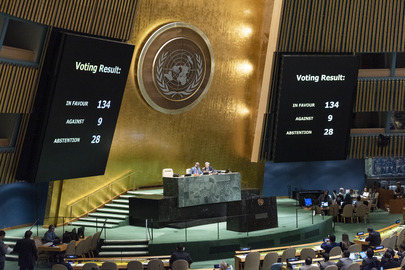Record rise in carbon dioxide levels during 2024: UN weather agency
Atmospheric carbon dioxide levels rose by a record amount in 2024, reaching new highs and locking in further long-term warming and extreme weather.
The warning comes from the World Meteorological Organization (WMO) in its latest Greenhouse Gas Bulletin on Wednesday.
The 2024 spike was likely amplified by an uptick in wildfires and a reduced uptake of CO₂ on land and at sea in 2024 – the warmest year on record, which saw a strong El Niño weather pattern effect.
Roughly half of CO₂ emitted remains in the atmosphere, while the rest is absorbed by land and oceans; but this storage is weakening as warming reduces ocean solubility and droughts increase.
Speaking at a press conference in Geneva, WMO senior scientific officer, Oksana Trasova, told journalists that more action is needed from policymakers.
“Policymakers need to be alerted that the systems and natural systems are impacted as well – and they might stop or reduce doing their work, so our actions should be towards the side of emission reduction as fast as possible if we don’t want to see the domino effect of the tipping point.”
Methane and nitrous oxide – the second and third most significant long-lived greenhouse gases – also set new emissions records.
Gaza: ‘great but precarious hope’; says UN humanitarian chief
UN agencies in Gaza have been taking advantage of the ceasefire to reach civilians in desperate need, but late Tuesday Israel announced it would limit the flow of aid, accusing Hamas of breaching the ceasefire agreement.
In a statement issued on Wednesday, the UN humanitarian chief, Tom Fletcher, said that following the endorsement by world leaders of the peace agreement, it was a moment of “great but precarious hope”.
Mr. Fletcher added that the international community must help reinforce the implementation of the deal in full, calling on Hamas to return all the bodies of deceased hostages, and on Israel to allow aid to flow in at scale.
UN humanitarians have set out a 60-day plan to surge aid into Gaza and “we will not accept any interference with our aid distribution,” the UN relief chief said.
WFP: Major funding cuts threaten six critical aid operations
Nearly 14 million people could face severe hunger by the end of the year, the World Food Programme (WFP) warned on Wednesday, highlighting six hotspots where funding cuts are forcing the agency to slash aid spending.
Programmes in Afghanistan, the Democratic Republic of the Congo (DRC), Haiti, Somalia, South Sudan and Sudan are already facing major disruptions which will only get worse, the UN agency said.
The situation is happening even as a global hunger rises, with 319 million people facing acute food insecurity – and amid famine in Sudan and the Gaza Strip.
“Every ration cut means a child goes to bed hungry, a mother skips a meal, or a family loses the support they need to survive,” said WFP Executive Director Cindy McCain.
The emergency food agency expects to receive 40 percent less funding this year, resulting in a projected budget of $6.4 billion, down from $10 billion in 2024.
Ana Carmo, UN News
Source of original article: United Nations (news.un.org). Photo credit: UN. The content of this article does not necessarily reflect the views or opinion of Global Diaspora News (www.globaldiasporanews.com).
To submit your press release: (https://www.globaldiasporanews.com/pr).
To advertise on Global Diaspora News: (www.globaldiasporanews.com/ads).
Sign up to Global Diaspora News newsletter (https://www.globaldiasporanews.com/newsletter/) to start receiving updates and opportunities directly in your email inbox for free.




























